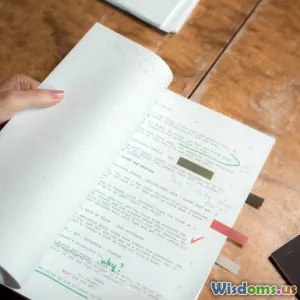
From Ideas to Words: The Writing Process
5 min read Explore the essential steps of the writing process, transforming ideas into compelling content. (0 Reviews)
From Ideas to Words: The Writing Process
Writing is an art that combines creativity with structure. Whether you're crafting a blog post, an article, or a novel, the writing process is crucial in turning abstract ideas into coherent, engaging text. This article delves into the various stages of the writing process, providing insights and tips to help both novice and seasoned writers refine their craft.
1. Inspiration and Idea Generation
The first step in the writing process is generating ideas. Inspiration can stem from various sources: personal experiences, current events, or even conversations. Techniques such as brainstorming, mind mapping, and free writing can help you uncover a wealth of ideas. Consider keeping a journal or a digital document where you jot down thoughts that spark your interest.
Tips for Idea Generation:
- Brainstorming Sessions: Set aside time to write down every idea that comes to mind without judgment.
- Mind Mapping: Create visual diagrams connecting your main idea to related concepts.
- Daily Journaling: Dedicate a few minutes each day to write freely about anything that inspires you.
2. Research and Planning
Once you have a solid idea, the next step involves research and planning. Depending on your topic, you may need to gather facts, statistics, or quotes from credible sources. This stage is essential for building a strong foundation for your writing.
Planning Your Piece:
- Outline: Create an outline of your article or story, organizing your ideas logically.
- Research: Use reputable sources to gather information that supports your main points.
- Audience Analysis: Consider who your audience is and tailor your content to their interests and needs.
3. Drafting
With your outline in hand, it's time to draft your piece. Don’t worry about perfection at this stage; focus on getting your ideas down on paper. Allow your voice and style to shine through, and remember that this is just the first version.
Drafting Techniques:
- Write Freely: Let your thoughts flow without stopping to edit.
- Set Time Limits: Use techniques like the Pomodoro Technique to maintain focus and productivity.
- Create a Comfortable Environment: Find a distraction-free space where you can write comfortably.
4. Revising and Editing
Revision is where the magic happens. After completing your draft, step away for a while before revisiting it. This break allows fresh eyes to catch errors and areas for improvement. Look for clarity, coherence, and overall flow.
Key Aspects of Revising:
- Content Review: Ensure all ideas are well-explained and supported.
- Structure Check: Confirm that your writing flows logically from one point to the next.
- Grammar and Spelling: Proofread for typos and grammatical errors, or use tools like Grammarly for assistance.
5. Finalizing Your Work
After revising, it's time to finalize your work. Ensure that your piece meets the necessary formatting and style guidelines. If you're writing for a specific publication, adhere to their requirements closely.
Final Touches:
- Formatting: Make sure your text is well-organized with appropriate headings, fonts, and spacing.
- Feedback: Consider sharing your work with trusted peers for constructive feedback before publishing.
- Publishing: Decide on the best platform for your content, whether it's a blog, social media, or a print publication.
Conclusion
The writing process is an essential journey that transforms raw ideas into polished pieces of content. By following these structured steps—from inspiration to finalization—you can enhance your writing skills and produce compelling work that resonates with your audience. Remember, writing is a craft that improves with practice, so keep writing and refining your process!
Rate the Post
User Reviews
Popular Posts





















